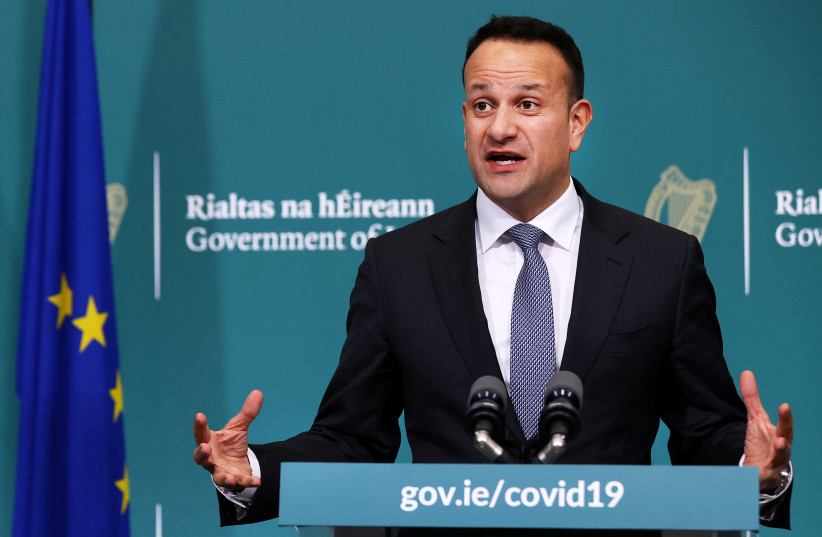With the streets of Ireland literally ablaze, Irish Prime Minister Leo Varadkar has stoked the fires with two short words that have created an international diplomatic crisis.
The taoiseach (Irish word for Prime Minister) thought it was highly appropriate to tweet late on Saturday night in response to the long-awaited release of nine-year-old Irish-Israeli citizen, Emily Hand, from Hamas terrorists: “This is a day of enormous joy and relief for Emily Hand and her family. An innocent child who was lost and has now been found and returned, and we breathe a massive sigh of relief. Our prayers have been answered.”
When most people think of the words “lost” and “found,” they expect them to be used when referring to a woolen scarf that was returned to the lost and found department at a local department store. So, how on earth can they seriously be used to refer to the cruel and sadistic capture of an eight-year-old girl?

Emily’s father, Thomas, didn’t just carelessly lose her like a parent may do in a crowded O’Connell Street in Dublin. Emily was taken hostage on October 7 from a sleepover together with her friend Hila Rotem in Kibbutz Be’eri, along with Hila’s mother, Raya.
Emily wasn’t found by some caring Good Samaritans after a few hours; she spent 50 days as a hostage in the hands of Hamas, only to be released as part of a deal that set 150 Palestinian terrorists free.
Varadkar’s tweet has attracted the ire of many Israelis, including Israeli Foreign Minister Eli Cohen, who summoned the Irish ambassador to Israel “for a reprimand” as a result of the taoiseach “trying to legitimize and normalize terror.”
An explanation has emerged that Varadkar was apparently referencing the New Testament Bible verse, Luke 15:24, about someone who was believed to be dead but actually was alive, in comparison to how Emily was thought to have initially been murdered but then was proven to be alive.
Clarification is not enough
On Sunday, Varadkar clarified his remarks by saying, “I think the vast majority of people understand what I was saying, recalling the amazing joy and awe that occurs when a child comes home. I’ve always been consistent in my unequivocal condemnation of Hamas and hostage-taking.”
While clarifying his condemnation of Hamas, which was missing from his original longer statement, Varadkar stopped short of apologizing for the immense hurt he caused to Israelis through his reckless and feckless language.
He is right about one thing: the vast majority of people understood exactly what he was saying and took him by his word that Emily was “lost and found,” hence the mass outrage.
From Oscar Wilde to Samuel Beckett to James Joyce, Ireland is a country that knows the outsized impact of words. It may be time for Varadkar to heed the words of fellow countryman Brian Friel.
The iconic playwright wrote in his poignant play Translations, “But remember that words are signals, counters. They are not immortal. And it can happen – to use an image you’ll understand – it can happen that a civilization can be imprisoned in a linguistic contour which no longer matches the landscape of... fact.”
AS THE master of his own words through his written statement, the “lost and found” image Varadkar used – which only he understood as being a Biblical reference – no longer matched the landscape of fact. The taoiseach should know better than to expect people to read between the lines to interpret what he thinks he is saying, especially on such an emotionally charged topic, and should take full blame.
Varadkar’s post comes just a few weeks after his comments on November 3, when he described Israel’s actions as “something approaching revenge,” and days after his answer at Leaders’ Questions, where he said: “Sadly, the Israeli government doesn’t listen to us. I’m not sure if the Israeli government listens to anyone anymore. They used to listen to the Americans. I’m not even sure that’s the case anymore.”
The taoiseach has, once again, proved why the Israelis shouldn’t listen to him. At the very time when he should be focusing on trying to calm Dublin’s fractured streets, he is instead lighting fires in Israel with his clumsy, hurtful language.
Ireland is, once again, an outlier in the West, home to some of the loudest criticism of Israel and support of Palestinian rights. Historically, Ireland’s pro-Palestinian support comes from identifying with those whom they view as being occupied.
“I understand Ireland in general is pro-Palestinian, and that’s fine by me,” says Thomas Hand. I understand where it comes from in history. Ireland was invaded by England, and we were the underdogs. They tried to eradicate the Irish language… Ireland has always been for the underdog.”
Hand has conducted himself in the most remarkable way since October 7 over the last 50 days, refusing to be the underdog and leaving no stone unturned until Emily was back home in Israel.
The taoiseach owes it to Thomas, to Emily, and to the other 239 hostages – those released and those waiting to be released – to be responsible with his language and not to eradicate what he wrote.
Varadkar should really listen to his own advice. In his response on Saturday to the stabbings and riots plaguing his capital, he said, “I call on us all to remember who we really are. Because we are better than this. And it’s time we came together and reminded others who claim to speak for us about what our country really stands for.”
He is right. We are better than this. Words matter, and he should apologize.
Leah Stern is a partner at Israel’s most active VC, OurCrowd, and mother to three Irish-Israeli boys. Irish-born Noam Mirvis is a former director of the All-Party Britain-Israel Parliamentary Group.
